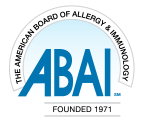MOC: A Four-Part Process for Continuous Learning
| Year | 1 | 2 | 3 | 4 | 5 | 6 | 7 | 8 | 9 | 10 |
| Part I: Professional Standing |
|
|||||||||
| Part II: Self-Assessment |
|
|||||||||
|
|
|||||||||
| Part III: Cognitive Expertise |
|
|||||||||
| Part IV: Practice Assessment/Quality Improvement |
|
|||||||||
Complete 1 practice assessment/quality improvement module
|
Complete 1 practice assessment and quality improvement module
|
|||||||||
ABAI diplomates must complete all four parts of the MOC process in order to successfully maintain their certification.
Professional Standing:
Medical specialists must hold a valid, unrestricted medical license in at least one state or jurisdiction in the United States, its territories or Canada.- Submit current copies of all medical licenses to ABAI
Lifelong Learning and Self-Assessment:
Physicians participate in educational and self-assessment programs that meet specialty-specific standards that are set by their member board.- Submit proof of 25 Allergy/Immunology CME credits completed each year
- Complete a patient safety module once every ten years
- Complete a recent advances module once every five years
Cognitive Expertise:
They demonstrate, through formalized examination, that they have the fundamental, practice-related and practice environment-related knowledge to provide quality care in their specialty.- Pass the proctored examination once every ten years
Practice Assessment/Quality Improvement:
Physicians are evaluated in their clinical practice according to specialty-specific standards for patient care. They are asked to demonstrate that they can assess the quality of care they provide compared to peers and national benchmarks and then apply the best evidence or consensus recommendations to improve that care using follow-up assessments.- Complete a practice assessment and quality improvement module once every five years
- Complete a communication module once every ten years
